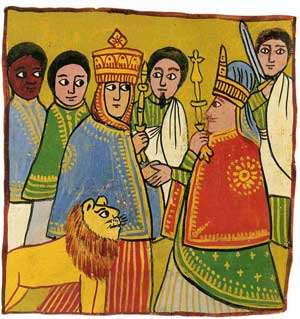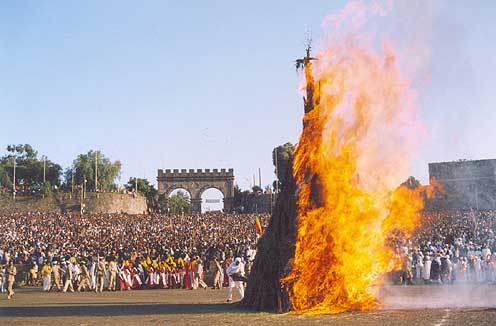 Enkutatash is the first day of the New Year in Ethiopia. It occurs on 11th September according to the Gregorian calendar, which is 1st Meskerem on the Ethiopian calendar.
Enkutatash is the first day of the New Year in Ethiopia. It occurs on 11th September according to the Gregorian calendar, which is 1st Meskerem on the Ethiopian calendar.
Ethiopia still retains the Julian calendar, in which the year is divided into 12 months of 30 days each and a 13th month of 5 days (6 days in leap year). The Ethiopian calendar is 8 years behind the Gregorian calendar from January to September and 7 years behind between 11th September and 8th January.
Enkutatash means the “gift of jewels”. When the famous Queen of Sheba returned from her expensive jaunt to visit King Solomon in Jerusalem, her chiefs welcomed her by replenishing her treasury with inku or jewels. The spring festival has been celebrated since these early times and, as the rains come to their abrupt end, dancing and singing can be heard in every village in the green countryside.
The date traditionally marks the end of the season of heavy rains and also marks the return of the Queen of Sheba to Ethiopia after her visit to King Solomon in Jerusalem.
 Meskel is an annual religious holiday in the Ethiopian Orthodox calendar commemorating the discovery of the True Cross by Queen Eleni in the fourth century. It occurs on 27th September in the Gregorian calendar and includes the burning of a large bonfire, or demera, based on the belief that Queen Eleni had a revelation in a dream. She was told that she should make a bonfire and that the smoke would show her where the True Cross was buried. So she ordered the people of Jerusalem to bring wood and make a huge pile. After adding frankincense to it, the bonfire was lit and the smoke rose high up to the sky and returned to the ground, exactly to the spot where the Cross had been buried.
Meskel is an annual religious holiday in the Ethiopian Orthodox calendar commemorating the discovery of the True Cross by Queen Eleni in the fourth century. It occurs on 27th September in the Gregorian calendar and includes the burning of a large bonfire, or demera, based on the belief that Queen Eleni had a revelation in a dream. She was told that she should make a bonfire and that the smoke would show her where the True Cross was buried. So she ordered the people of Jerusalem to bring wood and make a huge pile. After adding frankincense to it, the bonfire was lit and the smoke rose high up to the sky and returned to the ground, exactly to the spot where the Cross had been buried.